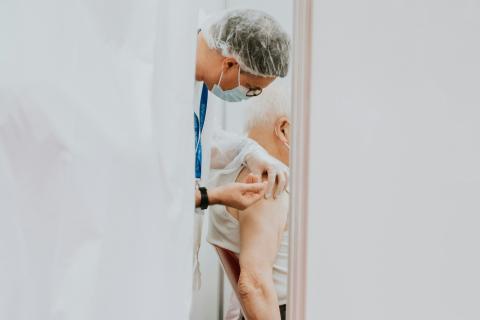
Saint Dymphna, the patron for those suffering nervous and mental afflictions, was born in Ireland in the seventh century. At the age of fourteen, she took a vow of chastity and consecrated herself to Christ. After this, her mother died, and her father’s mental health rapidly declined. This resulted in irrational thoughts and misguided actions towards his daughter. St. Dymphna fled from her father to Geel, Belgium, along with her spiritual director, Fr. Gerebernus. St. Dymphna was known for her works of charity, caring for the poor and sick. Eventually, her father found her and murdered her at the age of fifteen. She was martyred around the year 620 and canonized in 1247. Later, a church honoring her was built that responded to the people’s increased needs for treatment of mental illness. Due to the high volume of people needing these services, the church was expanded, and eventually individuals were cared for in the townspeople’s homes when the church could not meet the demand. The highly valued care for a person in their home or another’s home continues in our modern times.
Reflecting on St. Dymphna’s life correlates with the unique challenges individuals face that may prompt them to seek healthcare services in the mental health discipline. The overarching needs of mental illnesses may seem overwhelming and difficult to manage for the person and the treating healthcare professional. While practices for mental health treatment have greatly evolved over time, the need for treatment is still in high demand and many individuals do not have the opportunities to seek care and suffer in silence.
These needs, whether they are addressed professionally or not, challenge healthcare professionals and other individuals to look at the whole person and truly develop an understanding of the person. Care, compassion, and a unique desire to serve others must be undertaken by healthcare professionals. This requires all of us to look at the basic human dignity of every person’s life that is uniquely created by God. Only God knows our unique path in life, our challenges, our accomplishments, and our needs even if unstated. God provides each person’s human dignity that is present from the time of conception to death. St. Dymphna’s life influenced acknowledgment and understanding that Christ is the ultimate source of healing. Her deep devotion to Christ and her own personal sacrifices can encourage others to have faith and belief in Christ, the source of all healing.
Spirituality can be imparted in healthcare to better understand the person, providing a holistic approach and in turn, addressing the mental health needs of an individual. By not only addressing the physical aspects of illness or disability, spiritual wellness should also be addressed to offer a different approach to healing or coming to terms with insurmountable situations. Each person holds personal beliefs and views about spirituality that guide one’s behavior and existence in physical, emotional, intellectual, moral-ethical, volitional, and social dimensions. Individuals who experience illness or disability sometimes have significant life changes that lead to shifts in thinking about the meaning and purpose of life as well as acknowledging the importance of relationships with others. People who suffer from chronic illness may need support to face the challenges of their condition. Many disciplines in healthcare systems have opportunities to support this type of wellness if the patient provides consent.
At a time when a person may feel they have no hope or darkness is closing in on them, the influence of healthcare professionals to be the light or the guidance to a spiritual connection could provide opportunities for spiritual awareness, growth, and change that can influence personal mental health. As St. Dymphna’s life influenced the community in helping those with mental health needs, healthcare professionals can do the same and in turn, allow the patient’s community such as family and friends to embrace difficult circumstances with compassion and understanding. People with mental illness may feel shunned or not part of a community and these connections with others are paramount to each individual life. The community should give of themselves rather than the expectation of taking from the person of all that may be left. Each person has unique needs and healthcare professionals should be aware of these needs that meet a person where they are at in life and not place demands on the person that are more than they can give.
For Christians in healthcare, faith provides direction in their decisions. Their spiritual connection gives them opportunities to connect with their patients in a meaningful and purposeful way that allows Christ to shine through. Although they may not work with patients or colleagues that have similar views, they can bring a different perspective and understanding of how to provide the best care by placing God at the forefront of all their decisions.
As St. Dymphna was faced with circumstances some of us cannot imagine, she persevered, and her example guided others to support those struggling with mental health challenges. Her life influenced the creation of communities and a sense of belonging for those with mental health needs. Healthcare professionals are challenged to do the same by looking at the whole person and supporting individual journeys towards mental well-being.


